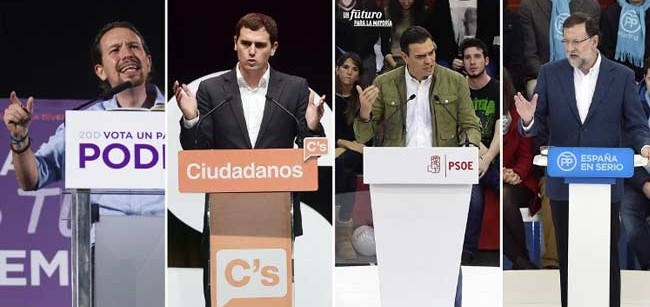PHOTO: Spain’s choice on Sunday — Podemos, Socialist Workers Party, Ciudadanos, or People’s Party?
Ellis Palmer Babe, of the University of Birmingham and Barcelona’s Universitat Pompeu Fabra, writes for EA:
Spanish politics is in a whirlwind of change. What was previously a stable bi-partisan system with two main parties, the People’s Party (PP) on the center-right and the Spanish Socialist Workers Party (PSOE) on the center-left, has been transformed in recent years by insurgent parties on the far left and in the center.
The country has gone four months without a Government after elections on December 20 failed to produce a clear outcome. The subsequent negotiations between the political groups could not reach an agreement with majority support. After many rounds of negotiations between the groups, King Felipe VI was forced to call new elections for June 26.
The People’s Party: Establishment and Austerity
The PP is often said to represent the elites and their interests after Generalissimo Francisco Franco’s 36-year rule ended in 1975, and is accused of using historical fears of the left and of regionalism to drum up support from the conservative middle classes.
The PP, led by the Galician Mariano Rajoy, have been in government since 2011, driving through an agenda of austerity and often incurring the wrath of affected citizens.
The PP declined from 185 seats in November 2011 to 119 seats in December 2015, falling short of the 176 required to form a majority government. However, they have remained in power as an acting government.
If it is possible to do so after June’s election, expect a governing pact between the PP and the Citizens Party (Ciudadanos), which has promoted a mix of social democracy and liberal-progressive positions. If this is not possible, some have spoken of a “grand coalition” of the PP and PSOE, possibly with the inclusion of Ciudadanos.
But before resorting to coalition politics, the PP will seek maximum support by positioning Rajoy as a safe option against “extremists”.
Socialist Workers Party: Struggling to Shake Off the 3rd Way
The centre-left social democratic PSOE began as far-left opposition to Franco. After the fall of the regime in 1975, it moderated its position under the leadership of Felipe González, governing between 1982 and 1996. It returned to government between 2004 and 2011, under José Luis Rodríguez Zapatero, who adhered to a third-way doctrine.
The PSOE was blamed, like many European social democratic parties, for its weak response in the face of the post-2008 economic crisis. Led by the uninspiring Alfredo Pérez Rubalcaba at the 2011 election, the PSOE was roundly defeated by the PP.
Rubalcaba stepped down in 2014, to make way for the more media-friendly Pedro Sánchez, but the political climate was still turning against PSOE. It was hampered by the rise of Podemos on the left and the national growth of Ciudadanos in the center, trapped in a defense of “moderate” policies that failed to convince. The party gained only 89 seats in December, leaving them a long way from governing with their preferred partners, Ciudadanos.
The PSOE did reach an agreement with Ciudadanos after the December election, but it still left them 47 seats short of a majority. There have also been internal rumblings — the party’s well-regarded leader in Andalucia, Susana Diaz, is widely expected by many to launch a leadership challenge in the near-future.
Following Sunday’s vote, the PSOE’s best opportunity to govern will probably be some form of broad-left alignment, although a coalition of PSOE/Ciudadamos/Podenos is improbable.
Podemos: The Leftist Insurgency
Formed in January 2014, Podemos (“We Can”) grew out of far-left social movements, such as those in the 15-M protests of 2011, to become the left’s popular insurgent party and the main challenger to the PSOE’s social-democratic discourse of reform.
Podemos has a charismatic leader in Pablo Iglesias, a university professor who became popular after participating in political chatshows, known as tertulias. It has been propelled by anti-austerity, anti-oligarchic policies that propose radical reforms as they blame the casta política for the economic crisis.
Its performance at the 2014 European elections thrust it into the spotlight, when the party came from nowhere with a national list to win five of the 54 seats.
Podemos has pursued alliances to contest subsequent local and regional elections, while forming pacts with small far-left lists for national ballots.
In December election, Podemos and its associated lists gained 65 seats to become the third-biggest party in Parliament. Until April, Podemos was in negotiations with the PSOE over the possibility of an agreement, but these broke down over PSOE’s insistence on the inclusion of Ciudadanos.
For Sunday’s election, Podemos has agreed to incorporate the small, ex-communist group United Left into the list Unidos Podemos. In recent weeks, the list has overtaken the PSOE. Some polls indicate that it could obtain 85 to 87 seats, compared to 80 to 82 for the PSOE on 80-82 seats. However, these positives have been accompanied by internal disputes between Iglesias and his deputy, Íñigo Errejón.
If the PSOE (or maybe even Podemos) gets near a majority, expect a PSOE/Unidos Podemos coalition. Any other pact will define Podemos as a strong Parliamentary opposition.
Ciudadanos: Seeking Ground in the Center
Founded in 2006 as a anti-nationalist movement in Barcelona, Ciudadanos has become a nationally-focused insurgent party on the centre to centre-right of the political spectrum.
Like Podemos, Ciudadanos are led by a telegenic young politician. The Catalan lawyer Albert Rivera was one of the founders of the group and has been a legislator since his election to the Catalan Parliament in 2006.
Ciudadanos rose with support from economically liberal middle-classes and those who desire institutional centralization to combat regional nationalism. By 2014, it had transformed from a Catalonia movement into a national party. There was much debate over whether Ciudadanos would form an electoral pact with the social liberal party Union, Progress, and Democracy (UPyD). The arrangement failed because of the UPyD’s leader Rosa Diez. However, it was UPyD have slipped into irrelevance, losing all of their deputies at December’s election, and many of their voters now supporting Ciudadanos.
Ciudadanos had a rather disappointing election in December, falling short of expectations with only 40 seats. After the election, they formed the controversial pact with the PSOE, but the parties were unable to attract any other partners to form a majority.
In recent months, Ciudadanos’ position has recovered. They are expected to be a crucial player in negotiations with the PP and the PSOE.






